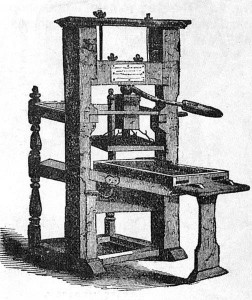
A page from one of Gutenberg’s Bibles Credit:http://www.lambethpalacelibrary.org /files/images/MS%200015%20f%20046r2_ edited-1_0.jpg
Johannes Gutenberg was not the inventor of movable type, but he is credited with the development of the printing press that would ultimately change the history of the world. Why is he credited with this invention despite the invention of movable type hundreds of years earlier? He created the business-like model that would let the press flourish for years to come.
Johannes Gutenberg was responsible for developing a realistic and efficient printing press, one in which his Chinese counterparts could not. In comparison to the Chinese, Gutenberg did not have to create thousands of characters to match his language. In addition, Gutenberg had wine presses, metalwork experience, and paper mills at his disposal, which would ultimately allow his invention to flourish. In order to make his product work, Gutenberg went through various trials and undertakings to develop the perfect product.
He manufactured his own ink, his own type pieces, and developed the technicalities involved with applying the proper pressure. It is said that the top-piece of the press weighed as much as a human person.

The first printing press. Credit:http://2.bp.blogspot.com/-brkhsxdaL6w/Uhyof04qhdI/ AAAAAAAADPI/nFYELH0Jtsk/s1600/ movable_typography-gutenberg_press- 14501317174421646.jpg
Despite Gutenberg’s inability to predict the legacy of his invention, he was wary of the content he produced. The period called for censorship, as heretical paranoia was widespread. Gutenberg knew he needed to create a product that would sell. A product that would appease the masses and give him widespread popularity. The Gutenberg Bible would be the product to transform the book-selling market, and in turn create a basis from which an enterprise would flourish. At 1,282 pages, the Gutenberg Bible was a challenging undertaking. Gutenberg’s invention cranked out 180 copies of these aesthetically brilliant Bibles in the time it took a monk scribe to make one. Ink was developed that would make the printed paper appear better than a scribe’s writing, and better on the eye. Efficiency at it’s finest. It would be hard to imagine our past without this invention, mainly because there would be no record of it.

Leave a response